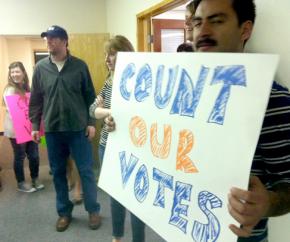UC grad union reformers’ sweeping victory
, a member of the University of California graduate employees union, reports on the significance of a victory for reformers in recent elections.
A REFORM caucus in United Auto Workers (UAW) Local 2865, which represents teaching assistants at the University of California (UC), swept the recent leadership election, gaining all 10 seats on the executive board, and over 60 percent of seats on the Joint Council, the local's highest elected body.
The caucus, Academic Workers for a Democratic Union (AWDU), was formed just over a year ago by union members angered at the local's lack of involvement in the movement to defend public education in California, and its rigid, autocratic governance structure. Among its campaign pledges, AWDU vowed to return control of the union to its members and to radically decentralize decision-making in a local that covers the entire state of California.
AWDU's path to victory was far from straightforward. The incumbent leadership hastily assembled a slate, United for Social and Economic Justice (USEJ), and immediately targeted the reformers.
As part of an aggressive smear campaign, USEJ alleged that AWDU was comprised of "homophobes" (even though seven out of the 10 AWDU executive board candidates are LGBT) and lacked representation among international students (AWDU's executive board slate included two international students, versus zero for USEJ). There is also strong evidence that USEJ misused union funds to pay candidates to fight the election and ensure the incumbents did not lose control.

The leadership's dirty tricks culminated in an attempt to steal the election partway through ballot-counting by throwing out the votes of members at UCLA and UC Berkeley, nearly half the total ballots cast. A sit-in by union members at the local's statewide office in Berkeley forced the leadership to resume the count last May 5, and a clear victory for AWDU was formally announced May 8.
AWDU's winning candidates now have a mandate to make serious changes in the way Local 2865 is run and to help members rebuild the union from the ground up.
The first step in this process will be a statewide membership meeting to be held May 21 at UC Berkeley, where all members will have an opportunity to debate and decide on a political strategy for the coming months. If successful, this meeting will be the first such meeting in the local's history to have a quorum, a clear indication of the former leadership's disinterest in member involvement.
Reformers plan to bring a number of proposals to help reignite the fight against cuts in the UC system, and in California more broadly. Re-energizing the fight for public education, as well as building greater and more effective solidarity among the union movement, were key aspects of the AWDU platform.
But AWDU reformers are under no illusions about the difficult road ahead. "We don't expect the UAW International to allow us to simply ride roughshod over their preferred strategy of 'partnership' with the bosses," says Brian Malone, a reform activist at UC Santa Cruz. "We anticipate that it will be a long and tough fight to reshape our union along genuinely democratic lines so that it can more effectively fight for its members' interests."
Nevertheless, with a strong base of support across the UC system, AWDU is in an excellent position to help members rebuild a grassroots local committed to social justice unionism. This, in turn, will allow members to position their union at the forefront of the struggle for public education in California, as well as play a key role in resisting the current wave of attacks against public-sector employees in the U.S.


